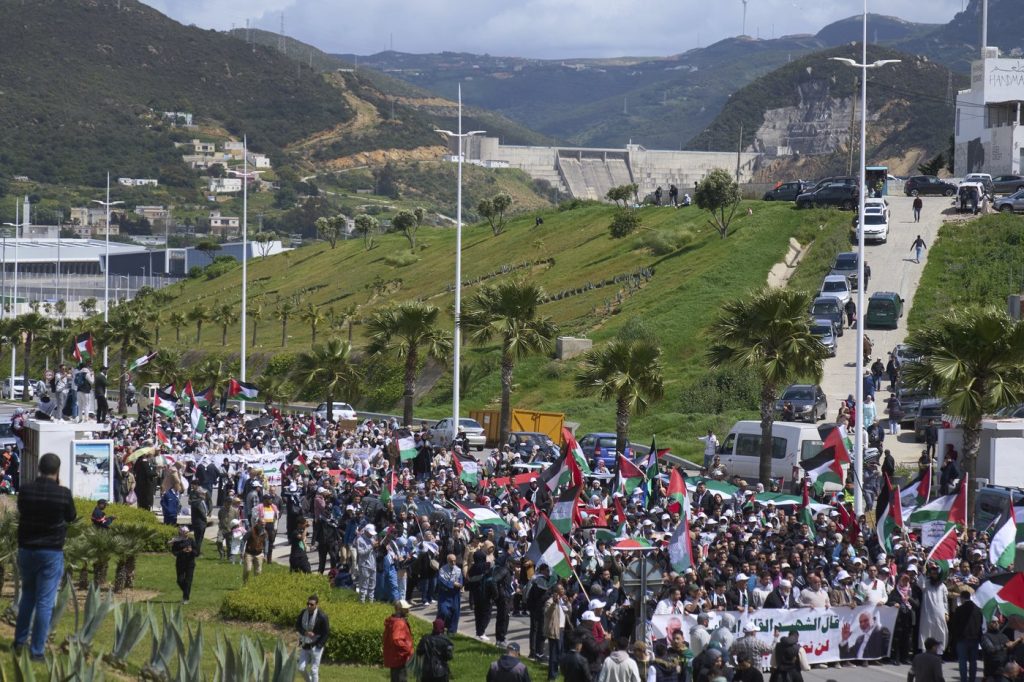TANGIER, Morocco Over the past year, Morocco has witnessed a surge of protests against the government's decision to normalize ties with Israel, a move that has deepened the divide between the ruling authorities and the general populace. Demonstrations have increasingly impacted the nation’s strategic ports, with protesters rallying against military shipments to Israel.
Among the demonstrators is Ismail Lghazaoui, a 34-year-old agricultural engineer. Recently, he participated in a protest adorned with Palestinian flags, voicing opposition to a vessel transporting fighter jet components from Houston, Texas. Lghazaoui and others are urging Moroccan port officials to block military cargo ships destined for Israel, following a similar move made by Spain in the previous year.
The Danish shipping company Maersk has become a focal point of these protests, as it facilitates the transport of components used in the production of Lockheed Martin's F-35 aircraft. Lghazaoui, a known activist who was previously imprisoned for participating in a boycott, remains undeterred by his past experiences. His arrest stemmed from posting statements about Maersk on social media after being violently confronted by police during a November demonstration in Casablanca.
Morocco is one of four Arab nations that normalized relations with Israel through the Abraham Accords brokered in 2020 during Donald Trump's presidency. Although this agreement brought U.S. support for Morocco's claims over Western Sahara, it has also sparked increasing public discontent as sentiments against normalization have intensified during the ongoing Israel-Hamas conflict.
Aboubakr Jamai, dean of the Madrid Center at the American College of the Mediterranean, notes the significant disconnect between the monarchy's actions and public opinion. Tens of thousands have rallied across Morocco, including families, students, and union members, which have gradually allowed radicals to take the forefront of these movements. Some protesters have resorted to burning Israeli flags, exhibiting deep-seated frustration against royal advisors like André Azoulay, a Jewish Moroccan.
While Moroccan authorities initially seemed to tolerate dissent, they have shown limits to this tolerance, with critics of the monarchy facing severe consequences. The Moroccan constitution permits freedom of expression, yet it remains illegal to criticize the monarchy or King Mohammed VI. Activists who denounce government ties to Israel are often met with arrests and prison sentences.
In response to the protests, activists have shifted their focus towards Morocco's ports, demanding that officials block vessels suspected of carrying military shipment to Israel. Recently, Morocco’s major labor union supported calls to stop two ships carrying fighter jet parts. The anti-monarchy Islamist movement Al Adl wal Ihsan has also played a role in mobilizing public support, claiming participation in over 110 demonstrations across 66 cities in solidarity with Palestinians.
Maersk has publicly acknowledged that its vessels transport items used in the assembly of military aircraft, but it denies claims of shipping weapons to conflict zones, citing a requirement for end-use certifications. However, Moroccan port officials noted that while cargo unloaded in Morocco undergoes examination, ships that stop en route to other destinations do not face the same scrutiny.
The tensions surrounding normalization with Israel, along with the Gaza conflict, have prompted some to question whether the focus on foreign issues distracts from domestic challenges, such as the marginalization of the Indigenous Amazigh population. The Islamist Justice and Development Party, previously supportive of normalization, has changed its tone, emphasizing solidarity with Palestine amidst the ongoing unrest.
In summary, the situation in Morocco illustrates the complexities of public sentiment in relation to government actions regarding Israel. As protests continue to unfold in major cities, the monarchy faces increasing pressure from both activists and the broader populace regarding its foreign policy and alliances.










